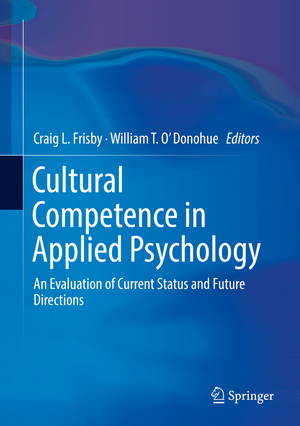Cultural Competence in Applied Psychology: An Evaluation of Current Status and Future Directions
Editat de Craig L. Frisby, William T. O'Donohueen Limba Engleză Hardback – 14 aug 2018
This timely book:
- Critiques the cultural competence construct and its evaluation as it is currently disseminated within applied psychology.
- Compares and contrasts how cultural competence is defined within clinical, school, and counseling psychology.
- Analyzes difficulties and challenges in understanding the cultural competence construct as evaluated through the lens of closely related fields outside of applied psychology.
- Spotlights complexities in cultural competence issues pertaining to specific populations.
- Sets out implications for education and training, offering a detailed outline for an ideal college course in cultural competence
| Toate formatele și edițiile | Preț | Express |
|---|---|---|
| Paperback (1) | 1410.15 lei 43-57 zile | |
| Springer International Publishing – 25 ian 2019 | 1410.15 lei 43-57 zile | |
| Hardback (1) | 1418.05 lei 43-57 zile | |
| Springer International Publishing – 14 aug 2018 | 1418.05 lei 43-57 zile |
Preț: 1418.05 lei
Preț vechi: 1729.32 lei
-18% Nou
Puncte Express: 2127
Preț estimativ în valută:
271.43€ • 294.93$ • 228.15£
271.43€ • 294.93$ • 228.15£
Carte tipărită la comandă
Livrare economică 21 aprilie-05 mai
Preluare comenzi: 021 569.72.76
Specificații
ISBN-13: 9783319789958
ISBN-10: 3319789953
Pagini: 822
Ilustrații: XVII, 731 p. 12 illus., 7 illus. in color.
Dimensiuni: 178 x 254 mm
Greutate: 1.51 kg
Ediția:1st ed. 2018
Editura: Springer International Publishing
Colecția Springer
Locul publicării:Cham, Switzerland
ISBN-10: 3319789953
Pagini: 822
Ilustrații: XVII, 731 p. 12 illus., 7 illus. in color.
Dimensiuni: 178 x 254 mm
Greutate: 1.51 kg
Ediția:1st ed. 2018
Editura: Springer International Publishing
Colecția Springer
Locul publicării:Cham, Switzerland
Cuprins
Introduction and Overview of the Handbook.- History, Theory, and Professional Standards.- History and Development of the Cultural Competence Construct. -Professional Standards/Ethical Documents for Service to Racial, Ethnic, Language, and Culturally Diverse Groups.- Current Status of Cultural Competence Advocacy in Clinical, School, and Counseling Psychology.- Scientific Foundations of Applied Practice.- Philosophy and Ethics of Science.- Conflicts in Intergroup Relations.- Attitude Change, Stereotyping and Perception Bias in Social Psychology.- The Culture Concept in Cultural Anthropology.- Individual Differences Psychology.- Fundamental Principles of Genetic Variation: Implications for Understanding Cultural Variability.- Research Designs for Identifying Interaction Effects.- Prevalence of Mental Illness in Human Subpopulations.- Contemporary Issues and Problems Within Racial/Ethnic Communities.- Contemporary Problems in African American Communities .- Contemporary Problems in Asian American Communities.- Contemporary Problems in Hispanic Communities.- Contemporary Problems in Native American Communities.- Issues, Problems and Controversies in Training for Cultural Competence.- Serving Clients in Poverty.- Ethnic/Racial Matching in Psychological Services.- The Protean Definitions of “Racism” in Contemporary Applied Psychology Training.- Legal Challenges in Cultural Competence Training.- Implications for Training and Helping People.- The Case for Cross-Cutting Knowledge and Principles in Applied Psychology Training.- Barriers to Service Delivery for Racial, Ethnic, Language, and Cultural Minority Groups.- How to Teach an Ideal Course in Cultural Sensitivity.- What Organizations, Principles, and Practices Truly Help People?.
Notă biografică
Craig L. Frisby, Ph.D is an associate professor of school psychology at the University of Missouri, Columbia. He is the former associate editor of School Psychology Review, the official journal of the National Association of School Psychologists, and currently serves as the associate editor of Psychological Assessment, the official assessment journal of the American Psychological Association. He is the co-editor of The Comprehensive Handbook of Multicultural School Psychology (2005), and the author of Meeting the Psychoeducational Needs of Minority Children (2013), both published by Wiley & Sons. He currently serves on the screening technical review committee of the National Center on Response to Intervention. He is a member of the National Association of School Psychologists, APA Division 16, and an elected member of the Society for the Study of School Psychology. William O’Donohue, Ph.D. is a licensed psychologist and chairman and professor of psychology at the University of Nevada, Reno, and an adjunct professor in the department of philosophy and a faculty member of the National Judicial College. He has published over 70 books and 150 journal articles and book chapters. He holds advanced degrees both in philosophy and psychology. For the past 14 years, he has been director of a free clinic that treats children who have been sexually abused and adults who have been sexually assaulted.
Textul de pe ultima copertă
The first volume of its kind, this provocative book evaluates the construct of cultural competence from multiple perspectives. At the intersection of diverse disciplines and domains, contributors argue for greater clarity in understanding the cultural competence construct, a deeper level of analysis as to its multifaceted components, and call for concrete practical objectives and science-based means of measurement. Serious, nuanced discussion addresses challenges, strengths, and limitations of current cultural competence practice in terms of sociocultural concepts (e.g., race, ethnicity) and practical concepts (e.g., sensitivity in the therapeutic relationship, treatment efficacy). In addition, contributors identify future directions for research, training, and practice with the potential to spur the further evolution of this clinically important construct.
This timely book:
- Critiques the cultural competence construct and its evaluation as it is currently disseminated within applied psychology.
- Compares and contrasts how cultural competence is defined within clinical, school, and counseling psychology.
- Analyzes difficulties and challenges in understanding the cultural competence construct as evaluated through the lens of closely related fields outside of applied psychology.
- Spotlights complexities in cultural competence issues pertaining to specific populations.
- Sets out implications for education and training, offering a detailed outline for an ideal college course in cultural competence.
Caracteristici
Provides practical means for enhancing cultural competence
Multidisciplinary, covering educational, counseling, and clinical psychology
Promotes critical, in-depth examination of cultural competence in psychology
Multidisciplinary, covering educational, counseling, and clinical psychology
Promotes critical, in-depth examination of cultural competence in psychology
